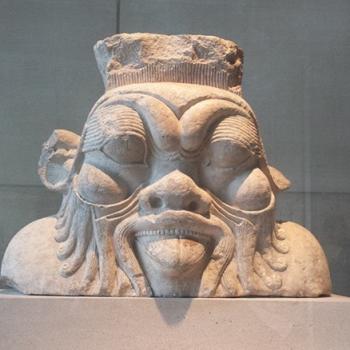Last week, my son Chandler and I watched Catching Fire with an international audience in London's Leicester Square. We were moved, outraged, and left wanting more, which has been the experience of almost every critic who has seen the film—and of audiences, who can't get enough of the movie. In its first two weeks in theaters, it has grossed over half a billion dollars worldwide, and is on track to become one of the top-earning films of all time. Why has the movie been such a hit? Jennifer Lawrence is phenomenal, sure, the action is engaging, but there's more happening in this movie than just entertainment. Something else about the story is appealing to people, and this week and next week, I'd like to break down some of the themes that are making audiences think and feel when they experience The Hunger Games saga on the page or on the screen.
Suzanne Collins' novel The Hunger Games came out in 2008 at a propitious time: it fell into a void in the entertainment world. Harry Potter had just concluded, and the Twilight series was, shall we say, appealing to a very particular demographic. But The Hunger Games and the two books that followed it appealed to males and females, to young adult and adult readers, and despite its dark—even grim—subject matter, the story garnered a huge following. Last August, Amazon announced that The Hunger Games was its most popular series ever—outselling both Potter and Twilight—and according to its publisher, Scholastic, the series has sold over fifty million copies in the United States alone.
Then last spring's adaptation of the first novel, directed by Gary Ross, extended that incredible popularity. It was, in fact, the third-highest opening for a film ever, and The Hunger Games went on to gross over $400 million domestically and almost $700 million dollars worldwide. To put those numbers in some perspective, The Hunger Games ranks fourteenth all time in domestic box office. That's means it made more money than any single Harry Potter film, any Lord of the Rings film, any movie with Spider-Man in it, any Twilight film, any James Bond movie, more money than The Passion of the Christ. Catching Fire is going to do at least as well—probably better, since blockbuster sequels often do. One pre-release projection in Variety suggested it might gross a billion dollars worldwide.
The Hunger Games has become such a cultural touchstone that it's even entered into our culture wars. The Wall Street Journal cited the saga in its attack on what it called the pervasive darkness of Young Adult literature. Capitalists have objected to what they consider its skewed depiction of a world dominated by the 1 percent. Concerned parents and advocacy groups have tried repeatedly to get the books pulled from libraries and curricula; in 2010 and 2011, according to the American Library Association, the Hunger Games books were among the most-challenged books in the country. And politicians and political commentators of all persuasions have used the story to extol their own policies and bash those of their ideological opponents, often selectively misreading the story in the process.
Those on the Left have argued that the books and films record the loss of social mobility, the reality of classes in our so-called classless society. Paul Krugman used The Hunger Games as a metaphor in the New York Times last summer in an angry essay about cutting food stamps in a time when we give farm subsidies to corporate agriculture. Those on the Right have used The Hunger Games to equate the Capitol with our Capitol and pillory central government as repressive and evil.
Everyone picks and chooses, and probably I am no different, although I'm going to start with, I hope, a better and more neutral reading than someone coming to the story with an axe to grind. Here's the critical presupposition that I bring to the saga: The Hunger Games story lets us explore theological and ethical questions through the characters of Katniss and Gale and Cinna and President Snow and the society they inhabit—a society that is just a few steps removed from our own.
There are a hundred spiritual elements I could talk about, and so little space. I want to open this week with two general observations. While we're going to talk about powerful theological and ethical questions and do that talking from a Christian understanding, The Hunger Games is not a Christian work. Some religious commentators have condemned the books and films as scandalous; others have found them to be deeply Christian. I'm going to alight in the middle of those extremes, which seems to me to be a realistic way to approach a work full of sacramental imagery written by a reclusive author supposed to be Roman Catholic, but set in a world that has no Christians, no conception of God, no real and abiding hope, and no belief in anything other than luck or chance. (And a thought: If the world of The Hunger Games feels dark and bleak, isn't it possible that part of the reason for that feeling is that the story depicts a world without God, a world in which the holy function of the Church has been taken over by the unholy spectacle of the Games?)





